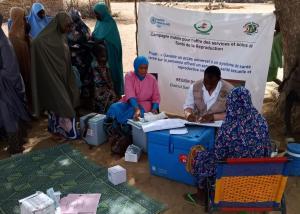Mobile clinics enhance access to health care services in Niger
Niamey – In Niger, West Africa’s largest country by land surface, access to health care services is a major challenge. Just one in two people has access to health services. One of the ways to bridge the gap is through mobile clinics in remote areas and deploying medical teams from health districts to villages.
Among the main beneficiaries of the initiative are pregnant women. They are now able to receive emergency assistance and care for timely detection of any complications. Mariama, 42, who suffered complications after a fall, is grateful to have received care thanks to a mobile clinic. Ordinarily, she would have had to travel for a whole day to the nearest district health facility in Dosso town from her home in the southwest of Niger.
“As I was preparing to make the trip, I was informed of a mobile clinic in our area, and I went there the very next day. The team midwife consulted me and discovered that I had premature rupture of membranes,” she recounts.
Under the initiative “mobile clinic teams visit villages that are hard to reach for health care in general and reproductive health services for women and children in particular,” says Nafissatou Salifou Panga, midwife and Reproductive Health Focal Point for Dosso health district. “It is a huge relief that pregnant women are able to benefit from care that detects risks in time and provides them with appropriate care.”
Thanks to the care and follow-up she received, Mariama gave birth safely. Like Mariama, 267 pregnant women in Dosso and Filingué districts benefited from mobile clinic consultations in 2024. In all, almost 28 000 people were consulted and 3767 women received reproductive health services. Around 16 000 women were sensitized by community outreach teams on reproductive, maternal and neonatal health in the two districts. In Mariama's case, the community health teams shared awareness messages that enabled her to be informed in time of the arrival of the mobile clinic.
By reaching populations far from health centres, the mobile clinic initiative also helps to improve health coverage at district and national levels. For example, the maternal mortality ratio fell from 441 per 100 000 live births in 2017 to 350 in 2023, according to World Bank data.
Dr Aissatou Laouali, in charge of the reproductive health programme with World Health Organization (WHO) in Niger, says the initiative helping to accelerate efforts towards health for all. “For vulnerable populations, rapid access to quality health care is vital. Through these initiatives, we hope to move forward in solving the challenges particularly faced by mothers and children living in remote areas."
To ensure service quality, the district, in collaboration with WHO, organizes planning meetings and field supervision trips and supports the Ministry of Health and Public Hygiene in improving maternal and child health, in particular by providing technical guidelines, standards and protocols for reproductive, maternal and child health.
Other support includes training health workers and improving the facilities in mother-and-child health centres, regional and district hospitals, and integrated health centres. WHO also supports training of health providers to ensure quality of care and health surveillance to curb maternal mortality.
Niger has maintained the mobile clinics introduced earlier. In 2024, with support from WHO and donor financing, operational and medical equipment and supply needs of the mobile clinics were catered for. Additionally, 56 health workers and community outreach officers were trained in reproductive health in Dosso and Filingué districts.
“I was very satisfied with the care provided … I encourage the women in my community to come to the mobile clinic for any health problem,” says Mariama. “If I hadn't gone to the centre after the incident, I would have had an infection with the risk of losing my baby."
Communications Officer
WHO Regional Office for Africa
Email: dialloka [at] who.int (dialloka[at]who[dot]int)
Communications Officer
WHO Niger
Email:fatia [at] who.int (fatia[at]who[dot]int)
